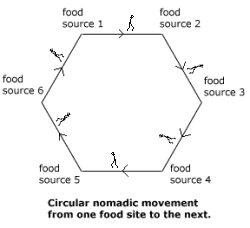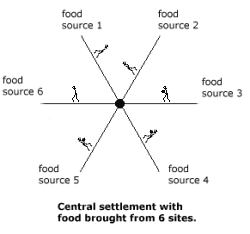
The Division of Labour
 It seems plausible to suppose that, prior to the emergence of human societies, individual humans lived lone, autonomous lives, moving from one source of food or water or shelter to another. Given a set of 6 food locations arranged on the points of a hexagon, the simplest route for all to take would have been to walk round the perimeter, from one location to the next, stopping to eat available food before moving on to the next location.
It seems plausible to suppose that, prior to the emergence of human societies, individual humans lived lone, autonomous lives, moving from one source of food or water or shelter to another. Given a set of 6 food locations arranged on the points of a hexagon, the simplest route for all to take would have been to walk round the perimeter, from one location to the next, stopping to eat available food before moving on to the next location.
 Assuming that a nomadic society consisted of 6 individuals, and it took an hour to move from one food location to the next, then a complete circuit of the hexagon would take each individual 6 hours, not including the time spent eating at each food location. If, however, the 6 individuals formed a society, based at the centre of the hexagon, and each went out and collected enough of each food for six individuals, and brought it back to the base camp, then each individual would have to make one return journey of 2 hours to a food location. At one step, 4 hours of travel are saved, to produce the same amount of food. Simply by cooperating in collecting food, this simple human society is much more idle than if each individual acts alone in his own interest.
Assuming that a nomadic society consisted of 6 individuals, and it took an hour to move from one food location to the next, then a complete circuit of the hexagon would take each individual 6 hours, not including the time spent eating at each food location. If, however, the 6 individuals formed a society, based at the centre of the hexagon, and each went out and collected enough of each food for six individuals, and brought it back to the base camp, then each individual would have to make one return journey of 2 hours to a food location. At one step, 4 hours of travel are saved, to produce the same amount of food. Simply by cooperating in collecting food, this simple human society is much more idle than if each individual acts alone in his own interest.
It is principally within human society that individuals increase their idleness. By acting in concert, rather than independently of each other, they increase their degree of freedom. In human society, rather than each person performing all the tasks necessary for their survival, each task is assigned to different individuals. Instead of each person gathering food and carrying water, collecting wood and cooking over a fire, one person gathers the food for all, another hauls water for all, a third collects wood for all, and a fourth cooks for all. And since it requires less effort for one person to perform these tasks, than if everyone collected their own, the result is that this division of labour reduces the amount of work needed to be done, and increases the idleness of society. And as each person becomes skilled in their work, the idleness of society increases further. And as labour-saving tools and techniques come into use, the idleness of society is raised further.
Furthermore, membership of human society offers insurance against misfortune. In the event of sickness or injury, individuals can expect to be cared for until they recover, on the understanding that they will do the same for others in turn. Autonomous individuals who become sick or injured will very often not survive
And membership of human society also allows the pooling of far greater degrees of skill and knowledge and experience than any lone autonomous individual could ever achieve.
But while membership of society brings rewards in the form of increased idleness, it comes at the price of a decrease in personal autonomy. The water-carrier must promise to collect water for everyone, and must carry out that promise. If he does not, and simply does what he personally chooses, then everyone will have to go back to collecting water themselves, and the benefits of social cooperation will be lost, and idleness will fall.
Furthermore, in such societies some sort of chain of command is required, to assign tasks to different people, to tell people what to do and when to do it.
Therefore the maintenance of society requires that its members make promises to others, and keep those promises. And it may also require that they accept and obey the commands of others. And that they be disciplined and reliable and trustworthy and honest. The reward for this discipline is an increase of leisure, during which each can do as he pleases, beyond the command of others.
Individual and society
Human society exists for the benefit of its individual members, not its members for the benefit of human society. Human society emerges when autonomous individual human life becomes difficult to sustain, and human society dissolves when autonomous individual life becomes easy.
In this respect, human societies emerge for exactly the same reasons that multicellular life emerges among unicellular life forms. Individual humans are themselves societies composed of many millions of cells, acting cooperatively, with a division of labour, and a chain of command. Upon the death of a human individual, the cells in the human body cease to act in cooperation, and become autonomous individual cells incapable of independent survival.
Nobody ever says that individual humans do not exist, but that they are simply collections of cells. Therefore nobody should say that human societies do not exist, but that they are simply collections of individual persons.
Human mind and body are mutually dependent upon each other, and it is a form of insanity when human mind supposes that it is some autonomous entity, separate and apart from, and even master of, the body that maintains and nourishes it. So also it is a form of social insanity when any state or government imagines that it has some existence that is separate and apart from, and master of, its component individual persons. The regular result of such insanity can only be the demise of either the individual or the society.
The primary and proper task of mind lies in the care of the human body. So also the primary and proper task of government lies in the care of the body of human society.
Self-interest and Public Interest
Individual persons are naturally concerned primarily with their own interest, and their own benefit. If so, why should any individual be concerned with the well-being if anyone else, or with the well-being of society?
The answer must be that within human society, people are mutually dependent upon each other. They depend on each other for every kind of food and drink, for shelter, for clothes and shoes, for protection, for advice, for assistance. Outside human society, an individual would not survive long. Within human society, all are helplessly bound together by close bonds of mutual dependency.
And therefore, whatever damages one individual damages all individuals. Where one individual cannot carry out his work, of cutting wood, or drawing water, or baking bread, then the society within which he works will go short of wood or water or bread. And therefore, while any individual must be primarily concerned with his own well-being, he must also be equally concerned with the well-being of the rest of the society, upon which he depends.
If in human society individuals are bound together in ties of mutual dependency, then one analogy for human society is that of a catenary chain stretched as a bridge across some gorge or abyss. Each individual is a single link in the chain, and holds fast, taking the strain. And if the chain breaks, then the whole chain falls into the abyss. It does not matter where the chain breaks, the result will always be the same.
And, using the same analogy, it may be seen that such a catenary chain is only as strong as its weakest link, and that therefore, to ensure that it does not easily break at one point, the stress should be distributed equally on every link. Thus individuals in human society should be concerned not just with themselves and with others, but in the most even distribution of work throughout society, so that no single individual becomes overstressed and liable to failure.
And as the idleness of human society rises, the stress upon each individual falls, until in a society of perfect idleness, there is no stress at all, and the bonds that tie men together in society fall away. And again, where the idleness of human society falls, the stress upon individuals rises, until at zero idleness the entire chain shatters, and flies apart.
External link: The Art of Nothing: Shoshone Indian culture.
 If the individual links in this chain take care only of themselves, and disregard everyone else, then they will not notice or act to prevent the impending failure some overstressed link in the chain.
If the individual links in this chain take care only of themselves, and disregard everyone else, then they will not notice or act to prevent the impending failure some overstressed link in the chain.
